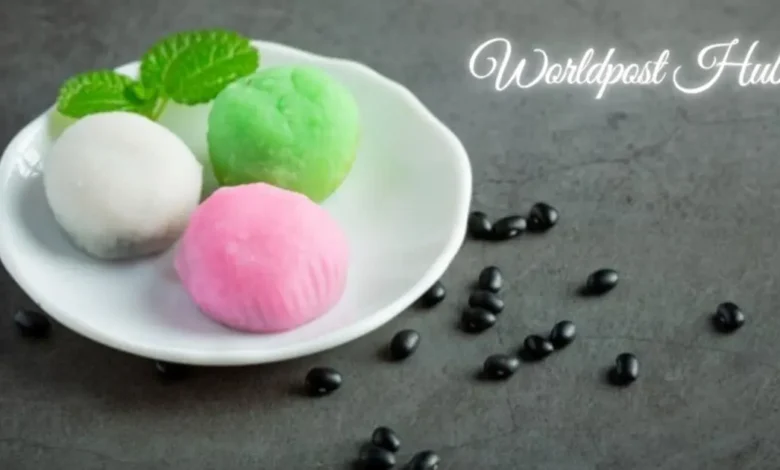Is Mochi Healthy? The Whys and Why Nots

Mochi, a popular rice cake originating from Japan and now enjoyed globally, prompts the question, “Is mochi healthy?” In this discussion, we’ll delve into the components of mochi, examine its nutritional profile, and weigh the factors that determine whether it can be considered a healthy addition to your diet.
What Is Mochi?
Mochi is a rice cake crafted from pounded short-grain glutinous rice, known as mochigome. Through this process, the rice attains a moldable texture, making it versatile for various culinary applications. Mochi is often combined with ingredients such as sugar, cornstarch, and water, and can be served either sweet or savory, with the latter often featuring soy and wrapping in seaweed or other edible leaves.
Are Mochi Unhealthy?
The healthiness of mochi hinges on three key factors: the quantity consumed, the serving style, and the added ingredients. In its basic form, mochi is a healthy and filling snack, with single servings typically containing around 100 calories. However, when additional ingredients like sugar are introduced, calorie content may vary. While indulging in a few pieces of mochi daily is generally acceptable, caution is advised, especially with high-sugar varieties such as those containing ice cream.
How Healthy Is Mochi?
Authentic mochi, especially when served with seaweed, offers a range of nutrients beneficial to health. These include riboflavin, iron, calcium, magnesium, Vitamin A, K, and E. Additionally, mochi is low in saturated fat and cholesterol, gluten-free, and rich in protein. The overall healthiness, however, depends on factors such as brand, ingredients, and portion control.
Is Mochi Good For Weight Loss?
Mochi’s impact on weight loss depends on portion size and the type consumed. While restraint in consumption, particularly of low-sugar varieties, may not contribute significantly to weight gain, high-sugar mochi, such as those with ice cream, can be counterproductive for weight loss efforts.
What Is the Healthiest Mochi?
The healthiest mochi options are those with minimal sugar content. Serving mochi in a savory style with soy sauce and seaweed enhances its nutritional value. Opting for low-sugar varieties and incorporating nutritious pairings contribute to a healthier mochi experience.
Is Mochi High in Sugar?
Mochi can be high in sugar, ranging from 6-13 grams per serving. While a single mochi may not pose significant harm, moderation is crucial, especially for individuals watching their weight or managing blood sugar levels.
How Much Fat is in Mochi?
Mochi typically contains minimal fat, approximately 1 gram per piece. The low saturated fat and cholesterol content contribute to its nutritional appeal. However, caution is advised when paired with fatty side dishes or ingredients.
Do Rice Cakes Make You Fat?
Mochi, being a type of rice cake, may contribute to weight gain if consumed excessively due to its high carbohydrate content. Limiting intake to 2-3 mochi per day helps control weight gain associated with the carbohydrates present.
Is Mochi Keto Friendly?
Traditional mochi is generally not keto-friendly due to its carb content, ranging from 14-24 grams per piece. Adjustments to mochi recipes may be necessary for those following a keto diet.
Is Red Bean Mochi Healthy?
Red bean mochi, made from adzuki paste, offers benefits such as weight loss and improved digestion. However, added sugar in most varieties may be a concern for those monitoring sugar and carb intake.
Is Green Tea Mochi Healthy?
Green tea mochi can be considered healthy due to the inherent health benefits of green tea. Portion control remains crucial, especially for individuals on low-carb or low-sugar diets.
Can Mochi Make You Sick?
Proper chewing is essential when consuming mochi to prevent potential health issues such as upset stomach or, in severe cases, obstructed bowels. Freshness, adherence to expiry dates, and thorough chewing are key considerations.
Is Mochi Dangerous?
The chewy texture of mochi poses a choking hazard, emphasizing the importance of thorough chewing. Japanese authorities caution against consuming large bites at once, particularly during holidays. Mochi, therefore, may pose a risk, especially for young children, toddlers, and the elderly.
Conclusion: Is Mochi Healthy? Well, Kind of…
In determining the healthiness of mochi, individual perspectives play a role. While mochi offers health benefits, such as being low in saturated fat and cholesterol, variations in sugar and carbohydrate content can impact weight and blood sugar levels. Tailored advice from healthcare professionals can guide individuals in incorporating mochi into their diets in a manner that aligns with their health goals.





